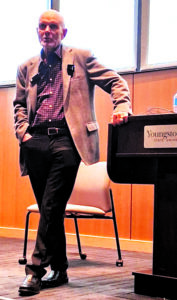Mayors in Valley urge caution on tax reform

YOUNGSTOWN — Local city mayors said they understand the need for property tax reform, but it shouldn’t cause devastation to communities and school districts.
“We support responsible property tax reform, but not at the expense of service delivery and not without some type of replacement or resolution for what those consequences will be if you alter property taxes,” Warren Mayor Doug Franklin said Thursday after a closed-door meeting of area mayors and state legislators organized by the Ohio Mayors Alliance.
In addition to Franklin, other mayors at Thursday’s event were Jamael Tito Brown of Youngstown, Don Dragish of Canfield, Steve Mientkiewicz of Niles and William Sherer II of Canton. They met with state Reps. Nick Santucci, R-Niles; Lauren McNally, D-Youngstown; David Thomas, R-Jefferson; and Monica Robb Blasdel, R-New Waterford.
The major topic was property tax reform.
State legislators are discussing various options to reduce the cost of property taxes, which has skyrocketed in the past few years.
Thomas is sponsoring a bill to limit unvoted property taxes collected by school districts.
The bill would limit the revenue school districts can receive from what is known as the 20-mill floor to inflation. Thomas, who represents portions of Trumbull County, said the bill would save Ohio homeowners nearly $1.7 billion over the next three years, starting with the second half of the 2026 tax bill. If approved, it would take effect with the second half of 2026 property tax bills.
Also, a grassroots group is circulating petitions to get a constitutional amendment on the November 2026 ballot to eliminate property taxes. About $30 billion is collected annually in Ohio from property taxes.
Brown said the legislators “talked about their ideas to kind of minimize the constitutional amendment,” and that they’re “trying to put in some pieces that may help relieve the pushback, the frustration that taxpayers are having” with increased property taxes.
Legislators are “trying to see if there’s a cap or a ceiling to help relieve some of the stress and the pain that taxpayers are having,” Brown said.
Franklin said there is a misbelief that because cities rely on income tax revenue to operate that a cut in property taxes won’t impact them.
“The point that we wanted to make is it would have collateral damage to cities because our cities are directly linked to our schools,” he said. “If we don’t have a great school district, then it’s tough for us to attract and retain residents. We wanted to make sure they didn’t have a misunderstanding that this would not impact cities.”
Keary McCarthy, executive director of the Ohio Mayors Alliance, said, “These conversations are important. We want to make sure that we can address the property tax concerns that Ohioans face, but we also want to make sure that our schools are well-funded. We also want to make sure that our public safety resources are there to keep communities safe and that’s the balance.”


